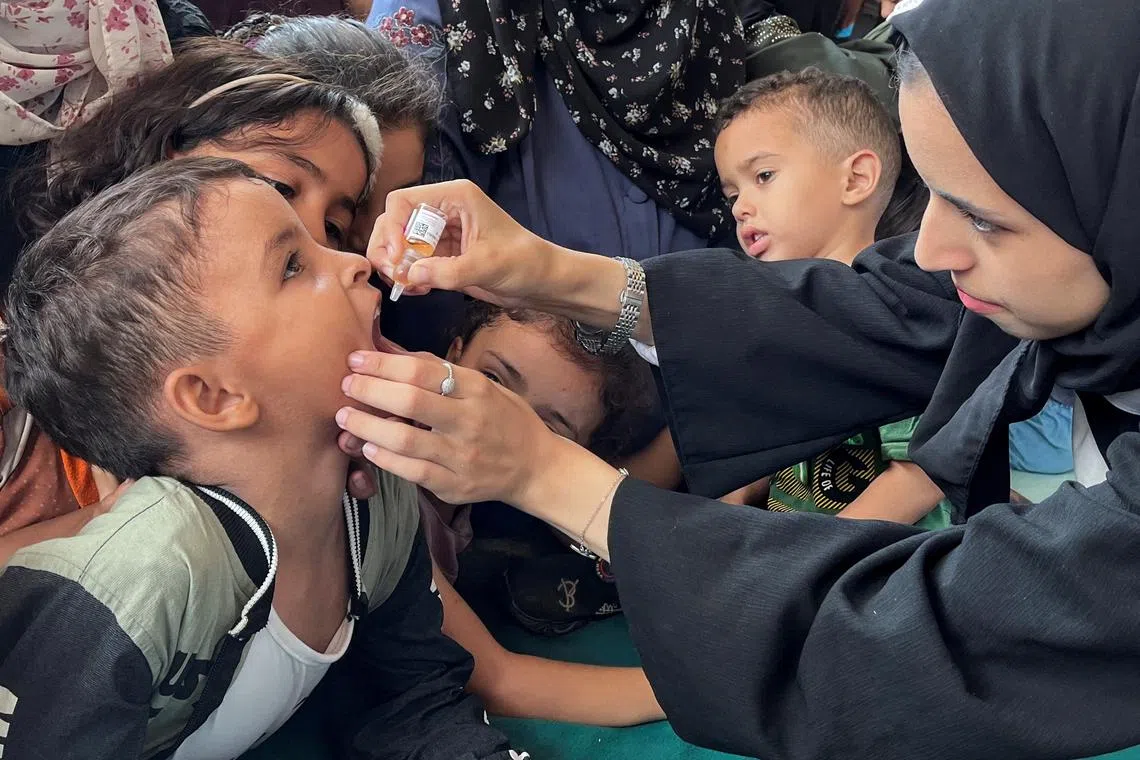UN begins polio vaccination for 640,000 children in Gaza as fighting rages on
Sign up now: Get ST's newsletters delivered to your inbox

A Palestinian child is vaccinated against polio in Deir Al-Balah in central Gaza on Sept 1.
PHOTO: REUTERS
Follow topic:
CAIRO – The United Nations, in collaboration with Palestinian health authorities, began vaccinating 640,000 children in the Gaza Strip on Sept 1, with Israel and Hamas agreeing to brief pauses in their 11-month war to allow the campaign to go ahead.
The World Health Organisation (WHO) confirmed in August that a baby was partially paralysed
The campaign began in areas of central Gaza, and will move to other areas in the coming days. Fighting will pause for at least eight hours
WHO said the pauses will likely need to be extended to a fourth day, and the first round of vaccinations will take just under two weeks.
“This is the first few hours of the first phase of a massive campaign, one of the most complex in the world,” said Ms Juliette Touma, communications director of UNRWA, the UN Palestinian refugee agency.
“Today is test time for parties to the conflict to respect these area pauses to allow the UNRWA teams and other medical workers to reach children with these very precious two drops. It’s a race against time,” Ms Touma said.
Israel and Hamas, which have so far failed to reach a deal to end the war, said they would cooperate to allow the campaign to succeed.
At one clinic alone in the central Gaza city of Deir Al-Balah, nearly 2,000 children were vaccinated on Sept 1, said Ms Louise Wateridge, a UNRWA spokeswoman.
UNRWA had mobile teams going from tent to tent, marking kids’ thumbs with ink once they received their doses.
“I came to the UNRWA clinic today to vaccinate my daughters against polio and, God willing, we won’t see any more diseases other than the diseases we are already experiencing. I hope we will go back to our homes safe and sound,” said Ms Afnan Al-Muqayyad.
Polio was just one of many of Ms Al-Muqayyad’s concerns.
“Skin diseases are widespread. There are no detergents. Detergents are very expensive, and we can’t afford them. Also, the food is very expensive. Everything is expensive, and the children’s weight is dropping. They were fine before, but now they’re becoming very thin. I hope God will set things straight,” she said.
WHO officials say at least 90 per cent of the children need to be vaccinated twice, with four weeks between doses, for the campaign to succeed.
But the vaccination drive faces huge challenges in Gaza.
“Children continue to be exposed. It knows no borders, checkpoints or lines of fighting. Every child must be vaccinated in Gaza and Israel to curb the risks of this vicious disease spreading,” said UNRWA’s Ms Touma.
With much of the infrastructure destroyed, and some 90 per cent of Gaza’s roughly two million residents having repeatedly fled Israeli bombardment, it may be impossible to ensure the immunisation of all the enclave’s estimated 640,000 children under age 10.
For families seeking to get their children vaccinated, the challenges are layered and fraught: Not only must they trust that the cessations in fighting will hold, but many will have to find transportation, navigate blocked and broken roads, and expose themselves to danger and widespread lawlessness to reach the vaccination sites.
The 2,100 people trained to conduct the vaccination drive will face risks, too, including anxieties over a history of deadly assaults on aid workers since the war began.
“There are a lot of drones flying over central Gaza, and we hope this vaccination campaign for children will be calm,” Dr Yasser Shaaban, medical director of Al-Awda hospital in Gaza, said on Sept 1.
Ms Wateridge said she heard some gunfire in central Gaza after 6am, but after that the area remained calm.
“It’s very hard to go from living in absolute fear for every second of your waking and even sleeping day to then suddenly be assured, ‘Oh no it’s fine now’,” she said.
“We’re also anxious to see what happens after 2pm. If the bombing continues after 2pm, this is, of course, going to impact the vaccination campaign... The only way to do this is a ceasefire.”
At a news briefing at Nasser Hospital on Aug 31, Dr Bassam Abu Hamad, a member of the polio campaign committee in Gaza, tried to encourage families to get their children vaccinated.
Acknowledging potential concerns some parents might have, he said the vaccine is safe and rarely has any side effects, and urged mothers to convince one another to get their children vaccinated.
“The amazing thing here is the perseverance and determination of the locals to get the vaccines despite the horrific and harsh situation we are all going through,” Dr Abu Hamad said.
Poliovirus, which is highly contagious, can cause paralysis and death of the unvaccinated.
Largely eradicated around the world by decades of public health campaigns, it can thrive in unsanitary conditions and in places where vaccination rates are not high enough. Such rates in Gaza, which health officials have said were at about 99 per cent as recently as 2022, have dropped significantly among babies because of the war.
As the campaign got under way, Israel continued to battle Hamas in several areas across Gaza.
Residents said Israeli soldiers blew up several houses in Rafah, near the border with Egypt, while tanks continued to operate in the northern Gaza City suburb of Zeitoun.
On Sept 1, Israel recovered the bodies of six hostages
The war was triggered after Hamas militants on Oct 7 stormed into southern Israel,
Since then, at least 40,691 Palestinians have been killed and 94,060 injured in Gaza, the enclave’s health ministry says.
REUTERS, AFP

